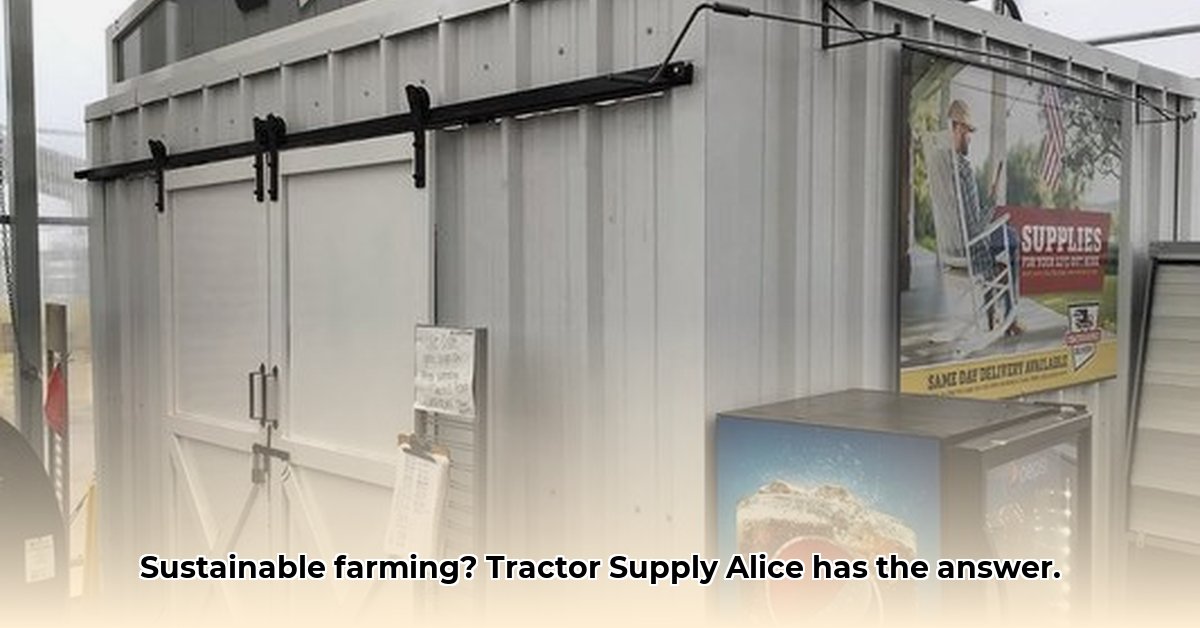
Tractor Supply Alice's Role in Sustainable Agriculture
Tractor Supply Company (TSC) in Alice, Texas, serves as a key supplier for local farmers and gardeners. However, the extent of its contribution to sustainable agriculture practices remains unclear. This article investigates the products TSC offers, assesses their potential for sustainable use, identifies knowledge gaps, and proposes actionable steps for improvement. We aim for a neutral, evidence-based analysis, highlighting both potential benefits and significant limitations. For more information on sustainable gardening practices, see our guide on rose bush care.
TSC Alice's Product Range for Sustainable Farming
TSC Alice stocks a variety of products relevant to farming and gardening. These include animal feed (essential for healthy livestock), fencing materials (crucial for animal containment and crop protection), and watering systems (contributing to efficient water usage). The store also provides gardening supplies such as soil, seeds, and tools. However, the sustainability of these products hinges on their sourcing, manufacturing processes, and the ultimate usage by farmers and gardeners – factors requiring further investigation.
Assessing TSC's Contribution to Sustainability
While TSC's product range could support sustainable agriculture, a crucial information gap exists regarding the company's commitment to sustainable practices. Currently, there's limited publicly available data on the environmental footprint of their supply chains. For instance, we lack information on whether animal feeds are produced using sustainable farming methods, if fencing materials are sourced from responsibly harvested timber, and what environmental impact the manufacturing processes have. This lack of transparency makes a definitive assessment of TSC's contribution challenging. The onus of sustainable practices ultimately rests on both TSC and the individual farmers and gardeners utilizing their products. A critical question is whether TSC prioritizes cost-effectiveness over sustainability in its supply chain.
Does this mean TSC is actively hindering sustainable farming? Not necessarily. It simply highlights a need for greater transparency and data on their sustainability initiatives.
Gaps in Knowledge and Future Research
Several significant knowledge gaps need to be addressed:
- Supply Chain Transparency: A detailed lifecycle assessment of TSC products is needed, tracing the environmental impact from raw material sourcing to product disposal.
- Comparative Analysis: Comparing TSC's product sourcing and manufacturing processes with those of competitors would reveal their relative sustainability performance.
- Environmental Footprint Data: Quantifiable data on the carbon footprint of TSC products and their packaging is crucial for a comprehensive assessment.
Addressing these gaps requires collaborative efforts between TSC, researchers, and local stakeholders.
Actionable Recommendations
To enhance the sustainability of farming practices in Alice, Texas, several actionable recommendations are offered:
For Local Farmers and Gardeners:
- Seek Sustainable Sourcing: Actively look for and prioritize products made from sustainable or recycled materials. Consider organic feeds and tools from environmentally responsible manufacturers. This direct consumer action drives market demand.
- Demand Transparency: Contact TSC Alice directly to inquire about their sourcing practices and sustainability initiatives. Express your preference for sustainable products and encourage greater transparency. This consumer feedback is invaluable.
- Share Best Practices: Share knowledge of sustainable practices and product sources with other local farmers and gardeners, fostering collective action and shared learning.
For Tractor Supply Company:
- Conduct Customer Surveys: Regularly survey customers about their preferences for sustainable products, allowing you to tailor your inventory to meet environmental concerns.
- Invest in Employee Training: Equip employees with knowledge about sustainable farming practices to better advise customers and drive informed purchase decisions.
- Improve Supply Chain Transparency: Publicly disclose information about your sourcing practices and sustainability-related efforts. This transparency builds customer trust. A publicly available sustainability report would be beneficial.
- Partner with Sustainable Suppliers: Work with suppliers committed to sustainable sourcing and manufacturing processes to expand your range of eco-friendly products.
For Local Government:
- Collaborate with TSC: Partner with TSC and local farmers to develop and implement initiatives promoting sustainable farming practices.
- Incentivize Sustainability: Offer financial incentives or other support programs to encourage local adoption of sustainable practices.
- Invest in Education: Fund educational programs and workshops to promote sustainable agriculture best practices among local farmers and gardeners.
Conclusion
Tractor Supply Company in Alice, Texas, possesses the potential to play a significant role in advancing sustainable agriculture. However, realizing this potential requires improved transparency regarding its supply chain practices and a proactive commitment to sustainability. Further research and a collaborative effort involving TSC, local farmers, and the local government are critical for assessing and enhancing the contribution of TSC to a more environmentally responsible agricultural sector in Alice. The lack of readily available data currently hinders a full assessment, emphasizing the need for future investigation.